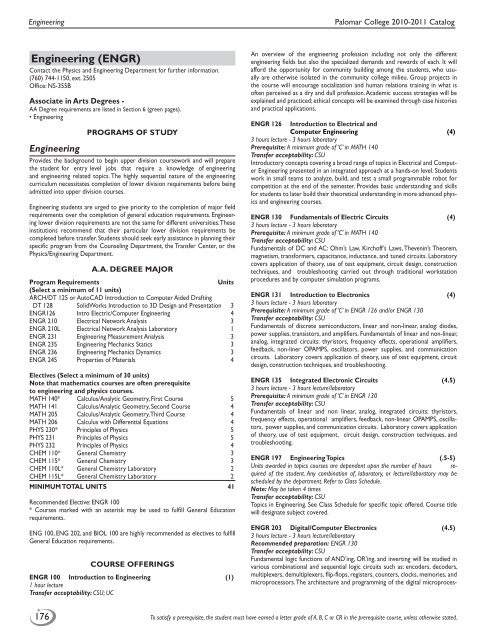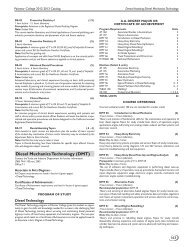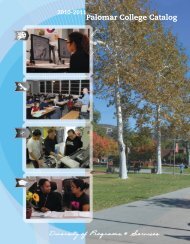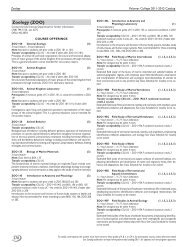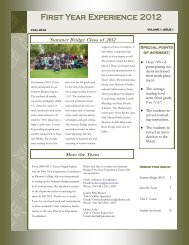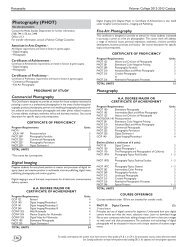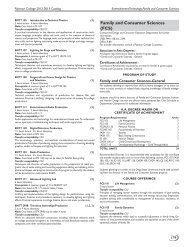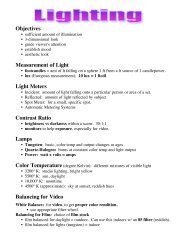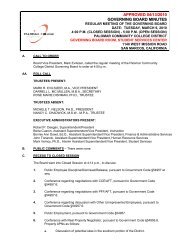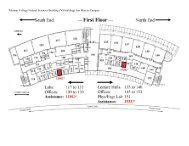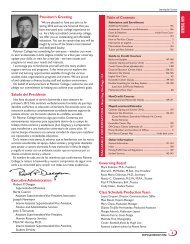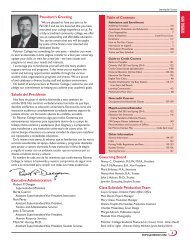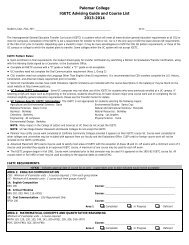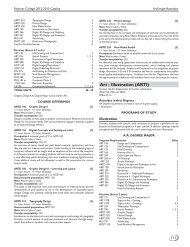Download the complete catalog - Palomar College
Download the complete catalog - Palomar College
Download the complete catalog - Palomar College
You also want an ePaper? Increase the reach of your titles
YUMPU automatically turns print PDFs into web optimized ePapers that Google loves.
Engineering<br />
<strong>Palomar</strong> <strong>College</strong> 2010-2011 Catalog<br />
Engineering (ENGR)<br />
Contact <strong>the</strong> Physics and Engineering Department for fur<strong>the</strong>r information.<br />
(760) 744-1150, ext. 2505<br />
Office: NS-355B<br />
Associate in Arts Degrees -<br />
AA Degree requirements are listed in Section 6 (green pages).<br />
• Engineering<br />
Engineering<br />
PROGRAMS OF STUDY<br />
Provides <strong>the</strong> background to begin upper division coursework and will prepare<br />
<strong>the</strong> student for entry level jobs that require a knowledge of engineering<br />
and engineering related topics. The highly sequential nature of <strong>the</strong> engineering<br />
curriculum necessitates completion of lower division requirements before being<br />
admitted into upper division courses.<br />
Engineering students are urged to give priority to <strong>the</strong> completion of major field<br />
requirements over <strong>the</strong> completion of general education requirements. Engineering<br />
lower division requirements are not <strong>the</strong> same for different universities. These<br />
institutions recommend that <strong>the</strong>ir particular lower division requirements be<br />
<strong>complete</strong>d before transfer. Students should seek early assistance in planning <strong>the</strong>ir<br />
specific program from <strong>the</strong> Counseling Department, <strong>the</strong> Transfer Center, or <strong>the</strong><br />
Physics/Engineering Department.<br />
A.A. Degree Major<br />
Program Requirements<br />
Units<br />
(Select a minimum of 11 units)<br />
ARCH/DT 125 or AutoCAD Introduction to Computer Aided Drafting<br />
DT 128 SolidWorks Introduction to 3D Design and Presentation 3<br />
ENGR126 Intro Electric/Computer Engineering 4<br />
ENGR 210 Electrical Network Analysis 3<br />
ENGR 210L Electrical Network Analysis Laboratory 1<br />
ENGR 231 Engineering Measurement Analysis 3<br />
ENGR 235 Engineering Mechanics Statics 3<br />
ENGR 236 Engineering Mechanics Dynamics 3<br />
ENGR 245 Properties of Materials 4<br />
Electives (Select a minimum of 30 units)<br />
Note that ma<strong>the</strong>matics courses are often prerequisite<br />
to engineering and physics courses.<br />
MATH 140* Calculus/Analytic Geometry, First Course 5<br />
MATH 141 Calculus/Analytic Geometry, Second Course 4<br />
MATH 205 Calculus/Analytic Geometry, Third Course 4<br />
MATH 206 Calculus with Differential Equations 4<br />
PHYS 230* Principles of Physics 5<br />
PHYS 231 Principles of Physics 5<br />
PHYS 232 Principles of Physics 4<br />
CHEM 110* General Chemistry 3<br />
CHEM 115* General Chemistry 3<br />
CHEM 110L* General Chemistry Laboratory 2<br />
CHEM 115L* General Chemistry Laboratory 2<br />
MINIMUM TOTAL UNITS 41<br />
Recommended Elective: ENGR 100<br />
* Courses marked with an asterisk may be used to fulfill General Education<br />
requirements.<br />
ENG 100, ENG 202, and BIOL 100 are highly recommended as electives to fulfill<br />
General Education requirements.<br />
COURSE OFFERINGS<br />
ENGR 100 Introduction to Engineering (1)<br />
1 hour lecture<br />
Transfer acceptability: CSU; UC<br />
An overview of <strong>the</strong> engineering profession including not only <strong>the</strong> different<br />
engineering fields but also <strong>the</strong> specialized demands and rewards of each. It will<br />
afford <strong>the</strong> opportunity for community building among <strong>the</strong> students, who usually<br />
are o<strong>the</strong>rwise isolated in <strong>the</strong> community college milieu. Group projects in<br />
<strong>the</strong> course will encourage socialization and human relations training in what is<br />
often perceived as a dry and dull profession. Academic success strategies will be<br />
explained and practiced; ethical concepts will be examined through case histories<br />
and practical applications.<br />
ENGR 126 Introduction to Electrical and<br />
Computer Engineering (4)<br />
3 hours lecture - 3 hours laboratory<br />
Prerequisite: A minimum grade of ‘C’ in MATH 140<br />
Transfer acceptability: CSU<br />
Introductory concepts covering a broad range of topics in Electrical and Computer<br />
Engineering presented in an integrated approach at a hands-on level. Students<br />
work in small teams to analyze, build, and test a small programmable robot for<br />
competition at <strong>the</strong> end of <strong>the</strong> semester. Provides basic understanding and skills<br />
for students to later build <strong>the</strong>ir <strong>the</strong>oretical understanding in more advanced physics<br />
and engineering courses.<br />
ENGR 130 Fundamentals of Electric Circuits (4)<br />
3 hours lecture - 3 hours laboratory<br />
Prerequisite: A minimum grade of ‘C’ in MATH 140<br />
Transfer acceptability: CSU<br />
Fundamentals of DC and AC: Ohm’s Law, Kirchoff’s Laws, Thevenin’s Theorem,<br />
magnetism, transformers, capacitance, inductance, and tuned circuits. Laboratory<br />
covers application of <strong>the</strong>ory, use of test equipment, circuit design, construction<br />
techniques, and troubleshooting carried out through traditional workstation<br />
procedures and by computer simulation programs.<br />
ENGR 131 Introduction to Electronics (4)<br />
3 hours lecture - 3 hours laboratory<br />
Prerequisite: A minimum grade of ‘C’ in ENGR 126 and/or ENGR 130<br />
Transfer acceptability: CSU<br />
Fundamentals of discrete semiconductors, linear and non-linear, analog: diodes,<br />
power supplies, transistors, and amplifiers. Fundamentals of linear and non-linear,<br />
analog, integrated circuits: thyristors, frequency effects, operational amplifiers,<br />
feedback, non-liner OPAMPS, oscillators, power supplies, and communication<br />
circuits. Laboratory covers application of <strong>the</strong>ory, use of test equipment, circuit<br />
design, construction techniques, and troubleshooting.<br />
ENGR 135 Integrated Electronic Circuits (4.5)<br />
3 hours lecture - 3 hours lecture/laboratory<br />
Prerequisite: A minimum grade of ‘C’ in ENGR 130<br />
Transfer acceptability: CSU<br />
Fundamentals of linear and non linear, analog, integrated circuits: thyristors,<br />
frequency effects, operational amplifiers, feedback, non-linear OPAMPS, oscillators,<br />
power supplies, and communication circuits. Laboratory covers application<br />
of <strong>the</strong>ory, use of test equipment, circuit design, construction techniques, and<br />
troubleshooting.<br />
ENGR 197 Engineering Topics (.5-5)<br />
Units awarded in topics courses are dependent upon <strong>the</strong> number of hours required<br />
of <strong>the</strong> student. Any combination of, laboratory, or lecture/laboratory may be<br />
scheduled by <strong>the</strong> department. Refer to Class Schedule.<br />
Note: May be taken 4 times<br />
Transfer acceptability: CSU<br />
Topics in Engineering. See Class Schedule for specific topic offered. Course title<br />
will designate subject covered.<br />
ENGR 203 Digital/Computer Electronics (4.5)<br />
3 hours lecture - 3 hours lecture/laboratory<br />
Recommended preparation: ENGR 130<br />
Transfer acceptability: CSU<br />
Fundamental logic functions of AND’ing, OR’ing, and inverting will be studied in<br />
various combinational and sequential logic circuits such as: encoders, decoders,<br />
multiplexers, demultiplexers, flip-flops, registers, counters, clocks, memories, and<br />
microprocessors. The architecture and programming of <strong>the</strong> digital microproces-<br />
176 To satisfy a prerequisite, <strong>the</strong> student must have earned a letter grade of A, B, C or CR in <strong>the</strong> prerequisite course, unless o<strong>the</strong>rwise stated.


